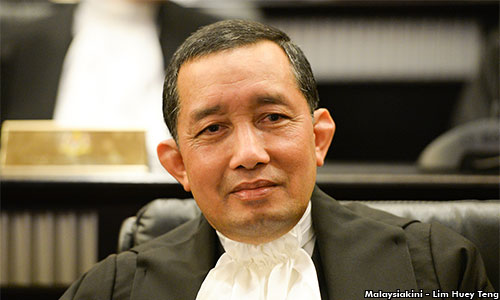
The Court of Appeal has reminded Malaysians that there are no absolute rights in the Federal Constitution, including the right to travel abroad.
Justice Idrus Harun said this in his 44-page judgment published today, in relation to Tony Pua's appeal to challenge a 2015 travel ban against him.
He referred to the last page of Malaysian-issued international passports, which states that a passport is the property of the Malaysian government and may be withdrawn at any time.
“This is clearly stated in the last paragraph of the passport. With all these conditions accompanying the issuance of a passport, we are inclined to say that at the most, any issuance of a Malaysian passport only carries with it a privilege and not a right to travel overseas.
“It is a privilege given by the government, and under certain appropriate circumstances, whether or not a person should be barred from leaving the country, is subject to the government’s discretion,” Justice Idrus said.
Justice Idrus was part of a three-member bench led by Justice Mohd Zawawi Mohd Salleh, which yesterday rejected Pua's appeal against the High Court’s dismissal of his judicial review application last year. The application contested the Immigration Department director-general’s decision to prohibit Pua from travelling overseas.
Lawyers for the DAP national publicity secretary have indicated that they will file an application for leave to appeal to the Federal Court soon.
A temporary ban
Justice Idrus, who was formerly Malaysia's second-highest-ranking prosecutor as solicitor-general, emphasised that the travel ban imposed on Pua had merely been temporary in order to facilitate criminal investigations against Pua at the time.
“Given the fact that Pua was being investigated under Section 124B of the Penal Code, this established fact would constitute a valid and legitimate reason to deny the appellant such privilege.
“The decision (by the Immigration Department) can scarcely be said or intended to be a permanent bar so that the appellant will be deprived of the privilege (to travel).
"It is merely a decision to facilitate the police investigations. The fact that his passport has not been withdrawn clearly supports our finding that the ban is not perpetual.
“Even if such privilege is a guaranteed right under the constitution as submitted by Pua's lawyers, we would hold with very little hesitation that no rights as enshrined in our constitution are absolute, for such rights are accorded subject to some permissible restrictions or restraints decreed by it,” he said.
Pua was barred from travelling to Yogyakarta, Indonesia, on July 22, 2015, after inspector-general of police Khalid Abu Bakar informed the Immigration Department's director-general, via a letter dated July 15, 2015, that the DAP politician was being investigated under Section 124B of the Penal Code on an alleged activity detrimental to parliamentary democracy. He was investigated as a witness and not a suspect.
As a result of this, Pua filed an application for judicial review in August 2015, to quash the Immigration Department's decision to issue the order to ban him from travelling abroad.
The Kuala Lumpur High Court had dismissed the application, ruling that the right to travel abroad was not a constitutional right for all.
However, the Immigration Department lifted the travel ban on Pua in October 2016.
His lawyers had previously argued that Pua's right to personal liberty under Article 5 of the constitution was affected as a result of the travel ban.
Limited freedom of movement
Justice Idrus recognised that under Article 9 of the constitution, there is a provision for freedom of movement which guarantees citizens the right to enter Malaysia, subject to the special immigration laws applied in Sabah and Sarawak.
He noted that Article 9 gives citizens the right to move or reside freely within the country subject to the limitations set out therein.
Nevertheless, he said, “It is silent as to the citizens’ right to leave the country, travel overseas and have a passport for that purpose, and accordingly in our judgment, the citizen has no constitutional right to leave the country and travel overseas”.
Arguing further on personal liberty and other rights enshrined under the subject of fundamental liberties in the constitution, the judge said fundamental liberties should not be viewed as including certain other rights such as the right to a passport, or the right to travel.
“Such rights are akin to privileges than rights of life or personal liberty matters, which fall more appropriately under Article 9 (freedom of movement),” he said.
Justice Idrus further ruled on the constitutionality of Section 59 of the Immigration Act, which excludes the right of the public to be heard before the director-general of the Immigration Department and the home affairs minister.
He stated that Section 59 of the Immigration Act was in line with Article 8(1) of the constitution, which declares the equality of all persons before the law and their entitlement to legal protection.
“We have no doubt at all that Section 59 is consistent with Article 8(1). Our decision is equally applicable to Article 8(1) as there is no reason for us to conclude that Section 59 offends the said article. Equality before the law and equal protection of the law under Article 8(1) require that like should be compared with like.
“What Article 8(1) assures individuals such as Pua is the right to equal treatment with other individuals in similar circumstances. It prohibits laws which require some individuals within a single class be treated differently. There is no such allegation or evidence that he is being treated differently,” he said.- Mkini


No comments:
Post a Comment
Note: Only a member of this blog may post a comment.